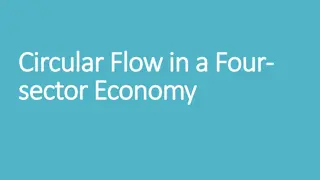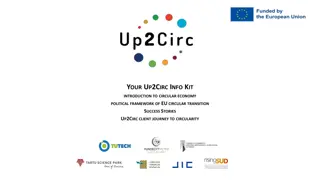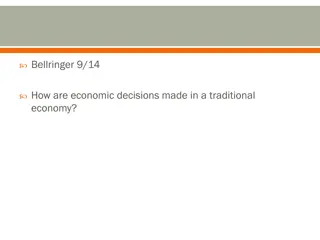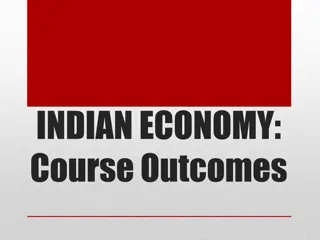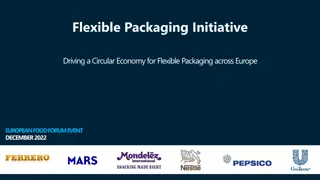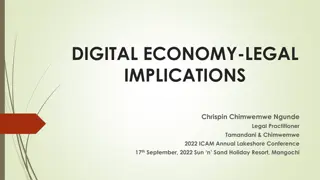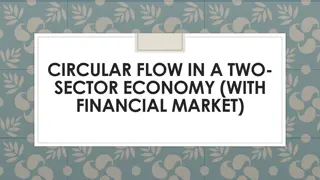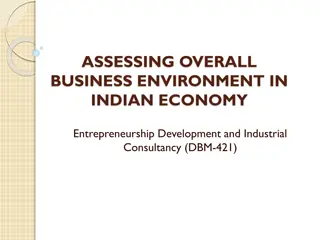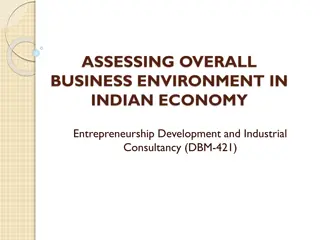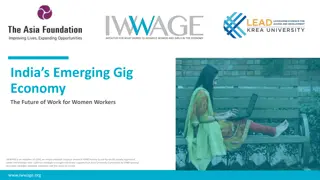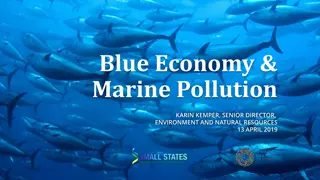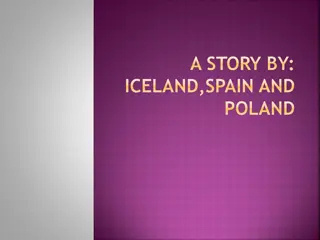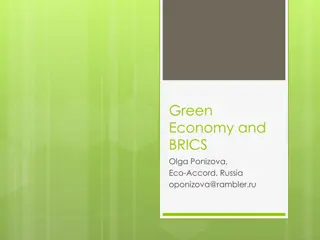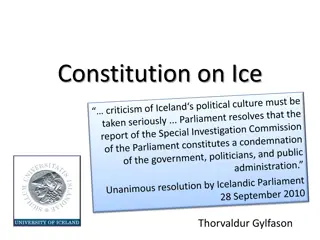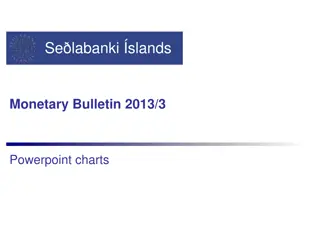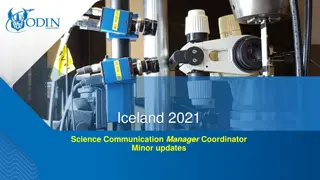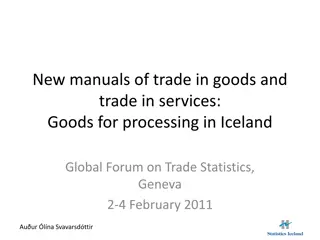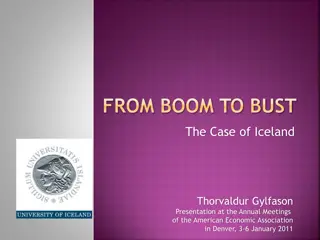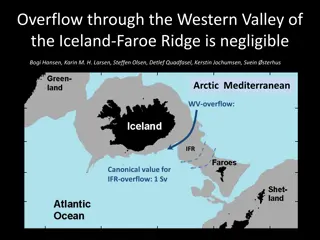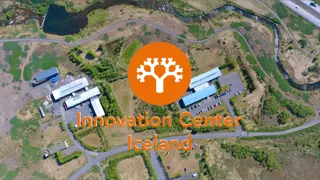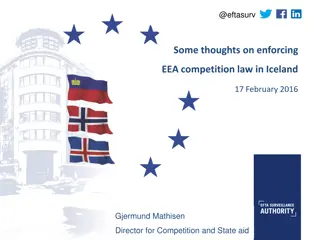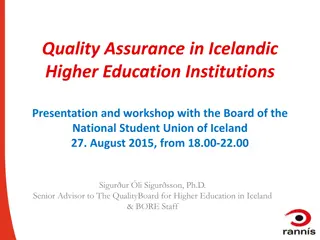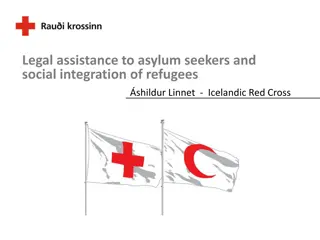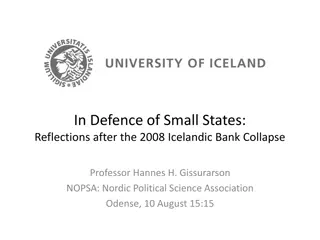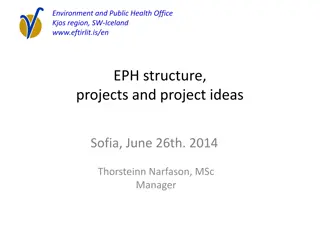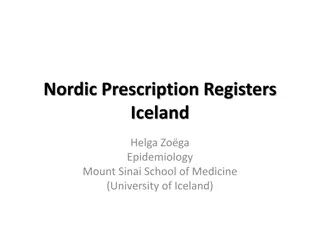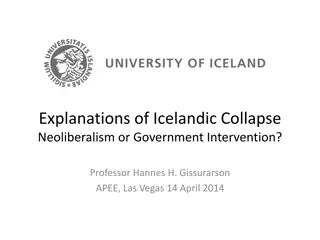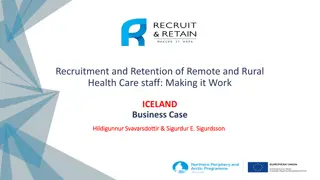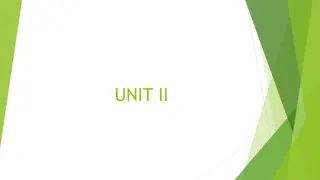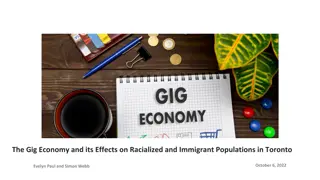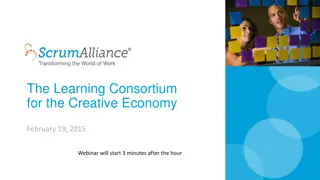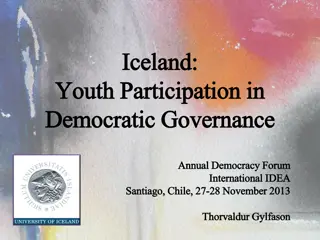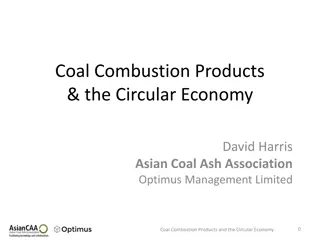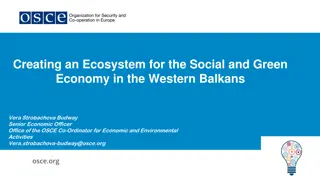Sustainability and the Blue Economy Concepts
The intertwining concepts of sustainability and the blue economy, focusing on historical developments, environmental protection events, and the emergence of sustainability science. Discover the pillars supporting a sustainable blue economy and pathways for inclusive development.
15 views • 40 slides
Circular Flow in a Four-Sector Economy Explained
The circular flow in a four-sector economy involves households, firms, government, and the foreign sector. Each sector plays a crucial role in money flows and payments, contributing to the continuous flow of income. The financial market also has a significant impact on the economy by accumulating sa
3 views • 8 slides
Glossary of Key Terms
Explore essential terms in economics such as command economy, consumer, demand, economic system, free enterprise system, goods, innovation, market economy, marketplace, mixed economy, needs, producer, profit, resources, scarcity, services, supply, technology, trade-off, traditional economy, and want
3 views • 6 slides
Accelerating Towards a Circular Economy Future
The circular economy presents a vital solution to tackle climate change by focusing on regenerative growth, reducing resource consumption footprint, and enhancing material use efficiency. The EU's Circular Economy Action Plan aims to usher in a sustainable future through decoupling economic growth f
2 views • 19 slides
Leveraging Non-Oil Exports for Nigeria's Blue Economy Growth
Nigeria Export Promotion Council (NEPC) focuses on diversifying Nigeria's economy by promoting non-oil exports for sustainable growth. The Blue Economy concept involves sustainable use of ocean resources for economic development. Nigeria's abundant ocean resources such as maritime transportation, fi
0 views • 20 slides
Economic Systems in the United Kingdom, Germany, and Russia
Economic decisions in traditional economies are based on customs and beliefs. The United Kingdom has a mixed market economy with a focus on service industries, while Germany's economy is export-based. Russia's economy leans towards a command system. By comparing these economic systems, one can see h
0 views • 11 slides
Understanding Indian Economy: Course Outcomes and Resources
Explore the course outcomes of the Indian Economy, covering economic development, policies, population growth, planning, agriculture, Kerala's economy, and resources for further study. Access government data and publications on the Indian economy for comprehensive learning.
0 views • 9 slides
Advancing Circular Economy Through Flexible Packaging Initiative
Flexible Packaging Initiative is driving a circular economy in Europe by emphasizing the importance of flexible packaging, showcasing key benefits, and outlining steps to ensure circularity in the recycling value chain. The initiative supports harmonized sorting labels, eco-modulated fees, and the p
5 views • 5 slides
Legal Implications of the Digital Economy in Malawi
Explore the legal implications of the digital economy in Malawi as discussed at the ICAM Annual Lakeshore Conference. Topics include the Electronic Transactions and Cyber Security Act, principles of implementation, Malawi CERT, data privacy, and the significance of the digital economy in transformin
0 views • 44 slides
Understanding Circular Flow in a Two-Sector Economy with Financial Market
In a two-sector economy with a financial market, households and firms engage in savings, investments, and borrowing through the financial market, unlike the simple circular flow assumption where no savings are made. This interaction between households, firms, and the financial market plays a crucial
0 views • 4 slides
Overview of Modern Business Environment in Indian Economy
Modern business in the Indian economy is characterized by large size, oligopolistic nature, diversification, global presence, technology orientation, and changing government regulations. The Indian economy features a mixed economy with both private and public enterprises, low per capita income, uneq
0 views • 14 slides
Overview of Business Environment and Economy in India
Business environment in India encompasses a mix of large, oligopolistic, diversified, and technologically oriented enterprises. The Indian economy is characterized by a mixed economy, low per capita income, and limited entrepreneurial potential. External and internal factors influence business opera
0 views • 14 slides
Insights into India's Thriving Gig Economy and Future Work Trends
India's gig economy, spearheaded by initiatives like IWWAGE, is reshaping the future of work, particularly for women. Key questions revolve around the gig economy's impact, legislative frameworks, and COVID-19 repercussions. Academia investigates the rise of gig work, focusing on platforms like Uber
0 views • 11 slides
The Blue Economy and Marine Pollution: A Comprehensive Overview
The presentation outlines the thriving ocean economy, the concept of the Blue Economy, the World Bank's approach, risks faced by oceans, and the impact of marine pollution on Small Island Developing States and coastal regions. It emphasizes sustainable development of oceanic activities, collaboratio
1 views • 12 slides
A Story by Iceland, Spain, and Poland
Gríla, Santa Claus's mom, decides to go on a holiday to relax after the busy Christmas season in Iceland. She travels to Reykjavik, where she encounters challenges and adventures along the way. From visiting Gullfoss to sneaking into a jet to the Canary Islands, her journey is filled with unexpecte
1 views • 5 slides
Insights into Social Economy and Social Dialogue Research Outcomes
Research outcomes from the Mesmer+ project at HIVA KU Leuven reveal misalignments in social dialogue inclusiveness, challenges faced by social economy entities, and the role of employers in the social economy. Recommendations include enhancing the role of social economy employers and promoting inclu
1 views • 7 slides
Exploring the Green Economy and BRICS Cooperation
The discussion focuses on the importance of the green economy for BRICS nations, suggesting ways for collaboration, especially in addressing climate change and transitioning to a low-carbon economy. The BRICS countries play a crucial role in global stability and sustainable development. Features of
0 views • 22 slides
Iceland's Constitutional Journey: From Economic Collapse to Democratic Reform
Iceland faced a unique situation post the 2008 economic collapse, responding with an IMF-supported rescue, financial fraud prosecutions, and a constitutional reform movement. Despite challenges, strong popular support and civic pressure pushed for political accountability and a new constitution, ref
0 views • 15 slides
In-Depth Analysis of Iceland's Economic Trends in 2013
Delve into the detailed monetary bulletin of Iceland in 2013. Explore charts on global economic affairs, external trade, domestic financial markets, and the real economy. Gain insights into the intricate financial landscape of Iceland during this period.
0 views • 38 slides
Iceland 2021 Science Communication Manager Coordinator Updates
Manage travel reimbursement for science communication event in Iceland 2021. Submit daily allowances online by 27th October 2021 with supporting documents. Follow guidelines for eligible expenses and avoid double funding. Acknowledge funding from COST and EU Horizon 2020 Framework Programme.
0 views • 12 slides
Trade Manual Updates: Goods Processing in Iceland
Explore the new and old manuals for trade in goods and services, focusing on goods processing in Iceland. Understand the changes in treatment, coverage, and implications for trade statistics. Learn about Iceland's role as a processing country in the metal industry, highlighting imports, exports, and
0 views • 23 slides
Iceland's Economic Journey: From Boom to Bust
Iceland's economic trajectory from being comparable to Ghana in 1904 to achieving high levels of prosperity by the 21st century, followed by a stark downturn due to political and economic mismanagement, offers a case study on the impact of governance on economic growth and stability.
0 views • 12 slides
Insights on Overflow through the Western Valley of the Iceland-Faroe Ridge
Research by Bogi Hansen, Karin M. H. Larsen, Steffen Olsen, Detlef Quadfasel, Kerstin Jochumsen, and Svein Østerhus delves into the negligible overflow through the Western Valley of the Iceland-Faroe Ridge. Various field experiments and data analyses demonstrate minimal flow through the Western Val
0 views • 12 slides
Innovation Center Iceland: Driving Diverse Projects and Technological Advancements
Innovation Center Iceland is a pivotal R&D and business support institution in Iceland, focusing on research, technology transfer, education, and entrepreneur support to boost innovation, productivity, and competitiveness. With over 90 employees in 6 locations, they engage in diverse projects coveri
1 views • 15 slides
Enforcing EEA Competition Law in Iceland: Fines and Actions
Discussion on enforcing EEA competition law in Iceland, covering topics such as setting appropriate fines, actions ESA can take against Icelandic entities, and examples of fines imposed on companies like Norway Post and Color Line for violating Article 53 and 54 of the EEA Agreement. The importance
0 views • 20 slides
Quality Assurance in Icelandic Higher Education Institutions Overview
Presentation and workshop showcasing the quality assurance framework in Icelandic higher education institutions, key figures, student population trends, comparison of HEIs in Iceland, and the Quality Enhancement Framework emphasizing internal quality management systems. The event was conducted by Dr
0 views • 29 slides
Legal Assistance and Social Integration Programs for Asylum Seekers and Refugees in Iceland
Icelandic Red Cross provides legal assistance to asylum seekers and supports social integration of refugees in Iceland. Programs include legal representation, asylum application support, family support systems, volunteer engagement, and cultural awareness initiatives for successful refugee integrati
0 views • 12 slides
Small States: Reflections and Insights
Small states like Iceland face unique challenges and benefits. Discussions revolve around the aftermath of the 2008 Icelandic bank collapse, the debate on joining the EU for shelter, historical shelters of Iceland, and the impact of small statehood on economic and political integration. Key points i
0 views • 16 slides
Environment and Public Health Office in Kjos Region, SW Iceland
The Environment and Public Health Office in Kjos Region, SW Iceland, is dedicated to promoting public welfare by ensuring a healthy environment and safe consumer goods. It is divided into 10 municipal control districts supervised by independent boards. The office focuses on various projects such as
0 views • 8 slides
Nordic Prescription Registers in Iceland: Overview and Coverage
The Nordic Prescription Registers in Iceland provide detailed data on prescription drug dispensing, covering variables such as drug user information, dispensing details, prescriber data, pharmacy information, and more. The database includes information on all reimbursed and non-reimbursed prescripti
1 views • 11 slides
Explanations of Icelandic Financial Collapse in 2008: Neoliberalism or Government Intervention?
The Icelandic financial collapse of 2008 was not solely attributed to neoliberal policies or government intervention but rather a combination of factors including vulnerable economic conditions and critical decision-making. Contrary to popular belief, Iceland was not more reckless or oversized in it
0 views • 18 slides
Recruitment and Retention of Remote and Rural Health Care Staff in Iceland
This project aims to enhance cooperation between a hospital and Akureyri municipality in recruiting health care professionals in Northern Iceland. By implementing a Seven Steps approach, the project seeks to improve medical staffing sustainability. The focus is on increasing permanent tenures and ad
0 views • 11 slides
The Impact of Pandemics on the Shadow Economy Performance
Pandemics have a significant impact on the shadow economy, influencing the legal economy in various ways. The shadow economy serves as a buffer for high unemployment rates and can contribute to budget revenues through legal spending. Studies suggest that a growing shadow economy may reflect dissatis
0 views • 12 slides
Making a New Constitution: The Case of Iceland
In the aftermath of the 2008 financial crash in Iceland, demands for a new constitution arose as part of the country's recovery process. This presentation by Thorvaldur Gylfason at TEPAV in 2012 discusses the background, process, substance, methods, and obstacles faced in the constitutional reform.
0 views • 28 slides
Evolution of Services Marketing in the Modern Economy
The shift towards a service economy has transformed marketing practices, leading to the emergence of Services Marketing as a distinct discipline. This evolution highlights the unique characteristics of services, such as intangibility and simultaneous production-consumption. The 1980s mark a pivotal
0 views • 13 slides
Understanding the Impact of the Gig Economy on Marginalized Groups in Toronto
This report delves into the effects of the gig economy on racialized and immigrant populations in Toronto. It outlines research findings, stakeholder insights, and strategic recommendations to address the challenges faced by marginalized groups in the gig economy. The study aims to shed light on the
0 views • 25 slides
The Learning Consortium for the Creative Economy Webinar Summary
The webinar on The Learning Consortium for the Creative Economy discussed key topics such as agenda details, presenters' backgrounds, poll results, and insights on the Creative Economy and its importance. Participants engaged in discussions on topics like the Recap on the Creative Economy, Scaling o
0 views • 43 slides
Iceland: Youth Participation in Democratic Governance
Iceland faced a crisis in 2008 when its banking system crashed, leading to significant social upheaval. The government resigned, and a new administration listened to the people's demands for reform. One crucial change was the promise of a new constitution drafted by a directly elected Constitutional
0 views • 12 slides
Coal Combustion Products & the Circular Economy - Addressing Resource Flow Challenges
This discussion delves into the intersection of coal combustion products and the circular economy, emphasizing the need for continuous re-evaluation of resource chains, ecosystem metabolisms, and industrial innovations to ensure sustainable environmental practices and economic growth. Exploring the
0 views • 24 slides
Advancing Social and Green Economy in Western Balkans
Creating an ecosystem for social and green economy in the Western Balkans is crucial for fostering peace, reducing disparities, and promoting sustainable business models. Initiatives like promoting innovation, job creation, and skills development among young entrepreneurs are key to driving growth a
0 views • 7 slides

